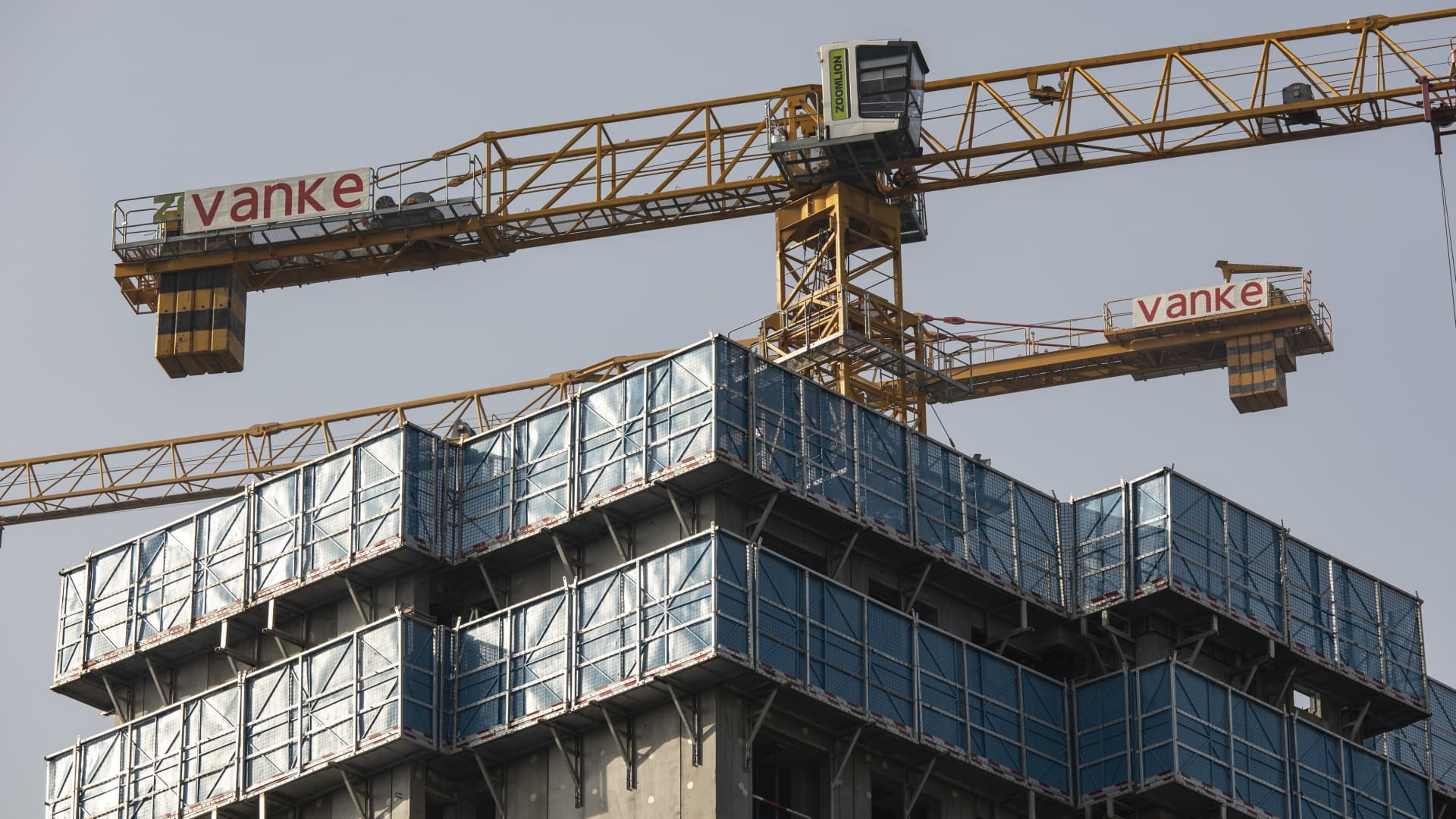BEIJING — China missed fourth-quarter GDP estimates on Wednesday, while it resumed reporting the unemployment rate for young people.
GDP for the last three months of 2023 rose by 5.2%, according to China’s National Bureau of Statistics. That’s below the 5.3% growth forecast in a Reuters poll.
GDP growth for the full year was also 5.2%, compared with a 3% increase in 2022.
“Macro data from 2023 shows China’s economy is going through a transition to a new growth model,” Zhiwei Zhang, president and chief economist at Pinpoint Asset Management, said in a note.
“With investment in the property sector falling, the economy is more dependent on the manufacturing sector and service sector,” he said. “This transition will take time to be accomplished. The key question in the market is when the transition in the property sector will finish.”
Property prices in 70 major Chinese cities fell by 0.4% in December from the prior month, maintaining a pace of decline not seen since 2015, according to data released Wednesday and analysis using Wind Information.
Real estate, which makes up well over 20% of China’s economy, has seen a government crackdown on developers’ high reliance on debt for growth.
Investment into real estate fell by 9.6% in 2023, while those into infrastructure and manufacturing rose by 5.9% and 6.5%, respectively.
Overall, fixed asset investment for 2023 rose by 3%, a touch above the predicted 2.9% increase.
China’s property sector is in a process of “adjustment and transformation,” Kang Yi, director of the statistics bureau, told reporters in Mandarin, translated by CNBC.
Looking ahead to 2024, he said the economy faces a number of challenges including insufficient domestic demand, overcapacity in some industries and weak expectations about the future.
Kang said authorities needed to respond to those difficulties in accordance with the directives from China’s top leaders in an annual meeting last month.
The statistics bureau on Wednesday also resumed reporting figures on youth unemployment.
Excluding people still in school, the unemployment rate for young people aged 16 to 24 was 14.9%, while the rate in cities in December was 5.1%.
The bureau had temporarily suspended the release of the younger age group’s unemployment rate in summer, citing the need to reassess calculation methods. That unemployment rate had previously climbed to records above 20%.
The statistics bureau said China’s population shrunk by more than 2 million people to 1.41 billion in 2023 from the prior year. The population had declined by 850,000 people in 2022 from 2021.
“The improvement [in youth unemployment] is a bit surprising to me, but I can see that it is a result of government efforts and not so much economic fundamentals,” Dan Wang, chief economist at Hang Seng Bank, said Wednesday on CNBC’s “Street Signs Asia.”
“High income jobs have been difficult to find, but lower-skilled work has not been difficult to find in 2023,” she said.
Uncertainty about future income has weighed on consumption.
Retail sales rose 7.4% in December from a year earlier, missing expectations for an 8% growth. They rose by 7.2% for the full year.
December saw a 29% surge in jewelry and 26% increase in purchases of clothes and shoes.
Sales of daily necessities, medicine, cultural and office products, as well as construction-related materials fell in December.
China had abruptly ended its Covid-19 controls in December 2022 and people had rushed to buy medicine amid widespread illness that month.
Industrial production rose by 6.8% in December from a year earlier, beating forecasts for 6.6% growth.
The economic data was as the market generally expected and already priced in, said Bruce Pang, chief economist and head of research for Greater China at JLL.
He said there’s uncertainty over how much stimulus Beijing will choose to pursue, and how authorities will balance short- and long-term risks. Pang said China will likely focus on fiscal support this year.
The statistics bureau indicated in a release Wednesday that as a part of economic support, Chinese authorities would work to improve policy coordination among different regulatory bodies.
“We must effectively enhance economic vitality, prevent and mitigate risks, improve social expectations, consolidate and boost the sound momentum of economic recovery and growth,” the bureau said, “in a bid to effectively upgrade the quality and appropriately expand the quantity of the national economy.”
China ended its stringent Covid-19 controls in late 2022, but its rebound from the pandemic wasn’t as fast as several economists had expected at the start of 2023.
This year, unless there are significant stimulus measures, China’s GDP growth could slow to 4.6% from 5.2% in 2023, according to an average of five investment firms’ forecasts compiled by CNBC.
“Monetary and fiscal policy last year was actually quite conservative. Given that we (China) is in such an economic downturn, we should have seen lower interest rates and more fiscal money spending in all levels of government,” Hang Seng Bank’s Wang said.
Chinese Premier Li Qiang in speech on Tuesday at the World Economic Forum in Davos noted that “in promoting economic development, we did not resort to massive stimulus. We did not seek short-term growth while accumulating long-term risks.”
“Rather, we focused on strengthening the internal drivers,” he said.
JPMorgan picks China stocks to buy now. Alibaba’s not on the list
Portfolio manager explains why he has the ‘most conviction’ in this China tech stock
China’s version of Spotify is ‘underappreciated,’ Morgan Stanley says
Goldman Sachs loves this sub-sector in China — and names 3 stocks to buy
The statistics bureau also said Wednesday that retail sales in services surged by 20% in 2023 from a year ago.
Online retail sales of physical goods rose by 8.4%, accounting for nearly 28% of overall retail sales.
Analysis of digital payments transactions by BigOne Lab found the low-income segment — earning 5,000 yuan ($700) or less — rapidly increased their average spending per person in 2023 from a year ago.
The low income segment is mostly made up of young people ages 18 to 24, the report said.
That contrasts with the high-income segment — making 10,000 yuan ($1,400) or more a month — whose spending tapered off in the second half of 2023.
— CNBC’s Shreyashi Sanyal contributed to this report.






